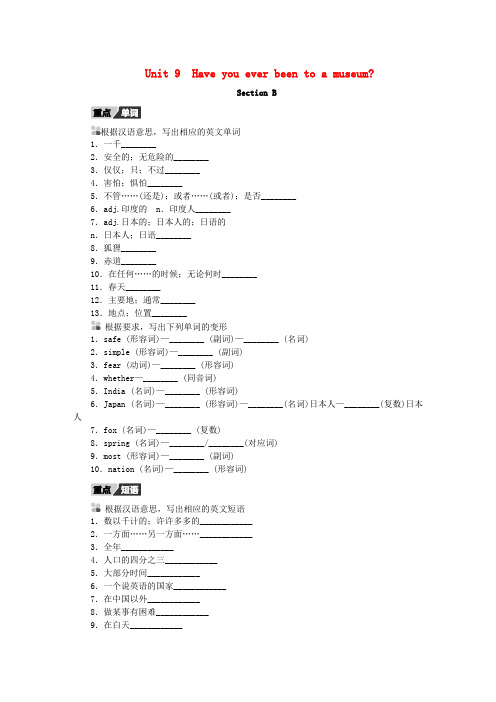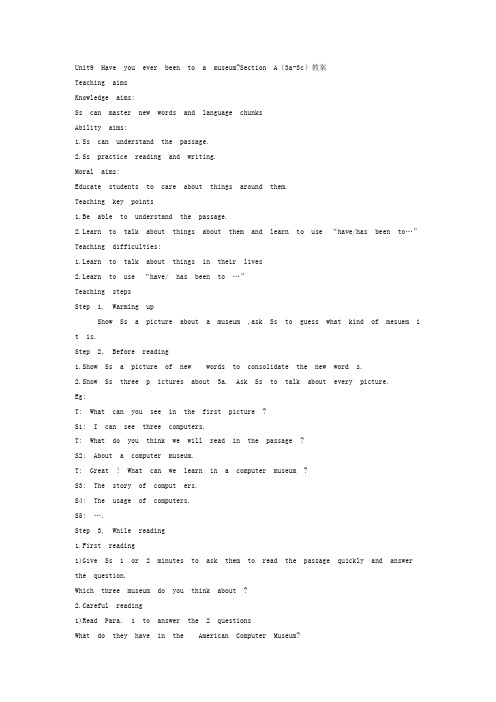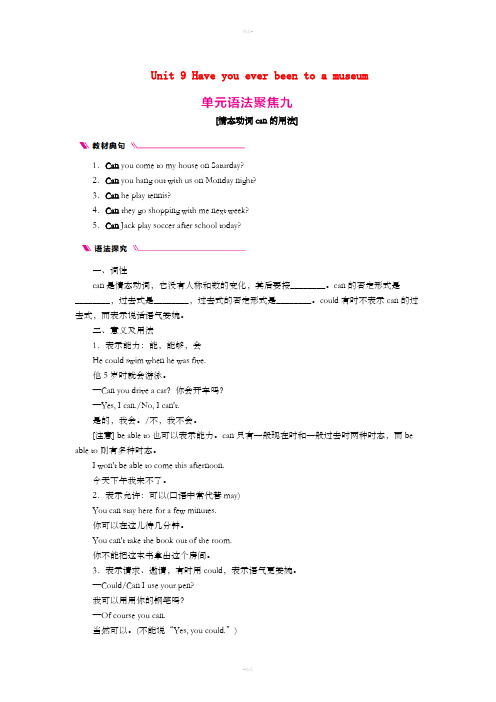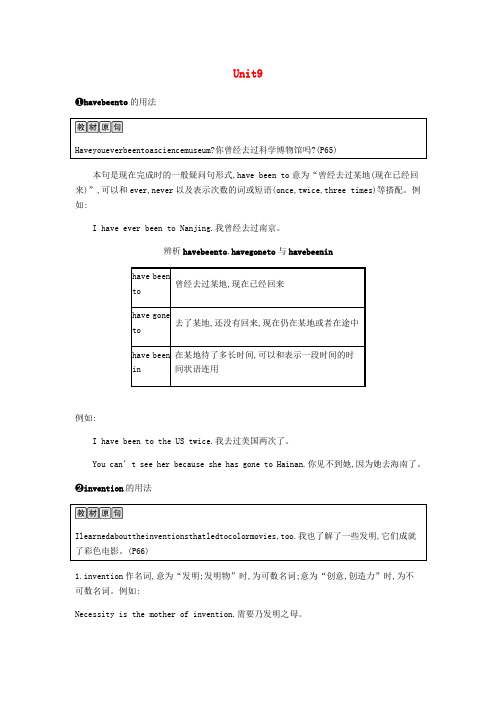2019年春八年级英语下册Unit9Haveyoueverbeentoamuseum练习(新版)人教新目标版
初中英语人教版八年级下册Unit 9 Have you ever been to

Unit 9 Have you ever been to a museum?教学目标1.语言目标:掌握谈论过去经历及好玩地方的相关词汇。
2.技能目标:能听懂谈论过去经历的对话材料;通过听说训练,学会谈论好玩的地方;能写出重点单词和重点句型,并能描述旅游地方。
3.情感目标:通过本课的学习,让学生掌握主题公园和博物馆的英文名称,培养学生热爱祖国大好河山的精神。
教学重点句子:1.—Have you ever been to a science museum?—Yes,I have.I went to the National Science Museum last year.2.—I have never been camping. —Me neither.3.It also encourages governments and social groups to think about ways toimprove toilets in the future.4.—I have been to the art museum many times.—Me too.And I have also visited the nature museum.5.Have you visited the Palace Museum?6.Have you been to the Great Wall?7.You won’t have any problem getting rice,noodles or dumplings.教学难点1.能熟练掌握并使用have / has been to以及already,ever与yet的用法。
2.能够运用所学句型谈论过去的经历。
第一课时Section AStep 1 GreetingNice to meet you! Nice to meet you,tooWhat day is it today? It is Monday.What is the date today? It is Juan 12th.How are you? -------Step 2 Guide1.Revise the present perfectUse some pictures about Beijing Shanghai Guilin Nanning Guangzhou Wuzhou,and then ask the students to answer the teacher’s question,e.g:—Have you ever been to-----------?—Yes,I have.No, I haven’t.2.Look at the picture and learn the new words.Step3 PresentationGuess the places of the pictures; they are the British Museum, space museum, history museum, water park, zoo, amusement park while lead in sentence patterns:“ Have you ever been to …?”Get students to work in pairs to practice the conversatio n: “Have you ever been to…”“Yes, I have.”/ Not, I haven’t.Step4 Pre-listening1a.1.Please read the names of these places. (Teacher writes the names on the blackboard.) Which of these places would you like to visit? Rank them from 1 to 5.S4: Amusement park _____, water park _____, zoo _____ aquarium _____ space museum _____.S5: Space museum _____, aquarium _____, zoo _____, water park ____, amusement park _____S6: …2. Talk about the picture.Step 5 ListeningListen and choose the best answer. The first and the second question aim to listening to time, and the third one aims to listen for the relationship. This activity trains students’ listening ability for listening for specific relationship.1)When did Sarah visit the National Science Museum?A. Today.B. Yesterday.C. Last year.2)When did Claudia visit the nature museum?st year.B. Last summer.C. Last school trip.3)What may the relationship be between the two speakers?A. Friends.B. Teacher and student.C. Mother and kid.Keys: 1-3 CCAListen again. Listen and check the boxes. Have these students ever been to theseAsk and answer in pairs:A: L et’s go somewhere different today.B: OK. Where do you want to go?A: Have you ever been to the space museum?B: No, I haven’t. How a bout you?A: …Step7 Listening2a. Listen and circle the places that you hear.2b. Listen again and circle T for true or F for false.Conversation 11. Tina went to the space museum last year. T/F2. John has never been to the space museum. T/F3. They are going to take the subway. T/FConversation 21. Linda has been to the amusement park. T/F2. Linda went to the amusement park yesterday. T/F3. Linda is going to the amusement park again by bike. T/FConversation 31. Frank had a great time at the water park. T/F2. Frank’s friend has never been to the water park. T/F3. Frank and his friend are going skating. T/FKeys: TFT TFT FTTSpeakingLook at the map in 2a and make conversations about the places.A: Have you ever been to the space museum?B: Yes, I have. How about you?A: No, I haven’t.B: Oh, it’s fantastic. Let’s go tomorrow.A: OK. How are we going to get there?B: We can take the subway.SpeakingRole-play the conversation in 2d.A: I went to the film museum last weekend. Have you ever been there? …B: Yes, I have. I went there back in April. ……Step8 Language points1. I learned about the inventions that led to color movies, too. 我还了解了一些发明,它们成就了彩色电影。
2019年春八年级英语下册 Unit 9 Have you ever been to a mus

Unit 9 Have you ever been to a museum?Section B1.一千________2.安全的;无危险的________3.仅仅;只;不过________4.害怕;惧怕________5.不管……(还是);或者……(或者);是否________6.adj.印度的n.印度人________7.adj.日本的;日本人的;日语的n.日本人;日语________8.狐狸________9.赤道________10.在任何……的时候;无论何时________11.春天________12.主要地;通常________13.地点;位置________根据要求,写出下列单词的变形1.safe (形容词)—________ (副词)—________ (名词)2.simple (形容词)—________ (副词)3.fear (动词)—________ (形容词)4.whether—________ (同音词)5.India (名词)—________ (形容词)6.Japan (名词)—________ (形容词)—________(名词)日本人—________(复数)日本人7.fox (名词)—________ (复数)8.spring (名词)—________/________(对应词)9.most (形容词)—________ (副词)10.nation (名词)—________ (形容词)根据汉语意思,写出相应的英文短语1.数以千计的;许许多多的____________2.一方面……另一方面……____________3.全年____________4.人口的四分之三____________5.大部分时间____________6.一个说英语的国家____________7.在中国以外____________8.做某事有困难____________9.在白天____________10.做某事的最好时间____________11.靠近;接近____________12.选择做某事____________13.远离____________14.在黑暗中____________根据汉语意思完成句子1.新加坡是一个说英语的国家。
八年级英语下册 Unit 9 Have you ever been to a muse

单元语法聚焦九
( B ) 8.2017·重庆B John and I ________to visit his grandparents
last Sunday afternoon.
A.go
B.went
C.will go
D.have gone
【解析】考查动词的时态。根据句中的时间状语“last Sunday afternoon” 可知,用一般过去时态,故选B。
单元语法聚焦九
( B ) 5.2017·泰州 Neither Jim nor Tom _______ Australia before,
but they know the country very well.
A.has gone to
B.has been to
C.have gone to D.have beento, have gone to 与 have been in
1.have been to 表示“去过某地”,现在已经不在那个地方了。如: My uncle has been to Beijing twice. 我叔叔去过北京两次。 2.have gone to 表示“去某地了”,指现在到了某地或在去某地的 途中。如: The Greens have gone to Dalian for a holiday. 格林一家去大连度假了。
Unit 9 Have you ever been to a museum?
单元语法聚焦九
Unit 9 Have you ever been to a museum?
单元语法聚焦九
语法精 讲 语法精 练
单元语法聚焦九
语法精讲
一、含ever 和 never的句式
ever 和 never虽同为现在完成时的标志词,但用法不尽相同。 ever 意为“曾经”,表示肯定意思,可用于肯定句、否定句和疑问 句。never 意为“从不”,表示否定意思,常用来回答含有ever的一 般疑问句。
初中英语人教版八年级下册unit9 Have you ever been to a

Unit9 Have you ever been to a museum?Section A(3a-3c)教案Teaching aimsKnowledge aims:Ss can master new words and language chunksAbility aims:1.Ss can understand the passage.2.Ss practice reading and writing.Moral aims:Educate students to care about things around them.Teaching key points1.Be able to understand the passage.2.Learn to talk about things about them and learn to use “have/has been to…”Teaching difficulties:1.Learn to talk about things in their lives2.Learn to use “have/ has been to …”Teaching stepsStep 1, Warming upShow Ss a picture about a museum ,ask Ss to guess what kind of mesuem i t is.Step 2, Before reading1.Show Ss a picture of new words to consolidate the new word s.2.Show Ss three p ictures about 3a. Ask Ss to talk about every picture.Eg:T: What can you see in the first picture ?S1: I can see three computers.T: What do you think we will read in the passage ?S2: About a computer museum.T: Great ! What can we learn in a computer museum ?S3: The story of comput ers.S4: The usage of computers.S5: ….Step 3, While reading1.First reading1)Give Ss 1 or 2 minutes to ask them to read the passage quickly and answer the question.Which three museum do you think about ?2.Careful reading1)Read Para. 1 to answer the 2 questionsWhat do they have in the American Computer Museum?What’s the differences between the old computers and the new ones ?2)Read Para 2 to answer the 2 questionsWhat did Amy see in the International Museum of Toilets in India ?What does the International Museum of Toilets encourage people to do ?3)Read Para.3 to answer the following questionsWhat do the tea art performances show?Why does LinLin’s grandpa love collecting tea sets ?4)Read the article again and answer the following questions (3b).What does Ken say about the American Computer Museum?What can we learn at the International Museum of Toilets?Why is the Hangzhou National Tea Museum a nice place to enjoy tea ?5)Read the passage and find out the difficult points. Disc uss them in groups.7) Share the whole story with students according to the chart.8) Retell the story according to the charts.Step4, After readingAsk Ss to finish 3c by themselves , then check the answers. Step5, HomeworkSearch other museums and try to write a report.。
2019年春八年级英语下册 Unit 9 Have you ever been to a museu

Unit 9 Have you ever been to a museum[情态动词 can的用法]1.Can you come to my house on Saturday?2.Can you hang out with us on Monday night?3.Can he play tennis?4.Can they go shopping with me next week?5.Can Jack play soccer after school today?一、词性can是情态动词,它没有人称和数的变化,其后要接________。
can的否定形式是________,过去式是________,过去式的否定形式是________。
could 有时不表示can的过去式,而表示说话语气委婉。
二、意义及用法1.表示能力:能,能够,会He could swim when he was five.他5岁时就会游泳。
—Can you drive a car?你会开车吗?—Yes, I can./No, I can't.是的,我会。
/不,我不会。
[注意] be able to也可以表示能力。
can只有一般现在时和一般过去时两种时态,而be able to则有多种时态。
I won't be able to come this afternoon.今天下午我来不了。
2.表示允许:可以(口语中常代替may)You can stay here for a few minutes.你可以在这儿待几分钟。
You can't take the book out of the room.你不能把这本书拿出这个房间。
3.表示请求、邀请,有时用could,表示语气更委婉。
—Could/Can I use your pen?我可以用用你的钢笔吗?—Of course you can.当然可以。
(不能说“Yes, you could.”)[注意] (1)表示允许别人做某事时,只能用can,不能用could(这里表示语气委婉)。
2019春八年级英语下册 Unit 9 Have you ever been to a museum课时内容精讲素材 (新版)人教新目标版

Unit9❶havebeento的用法本句是现在完成时的一般疑问句形式,have been to意为“曾经去过某地(现在已经回来)”,可以和ever,never以及表示次数的词或短语(once,twice,three times)等搭配。
例如:I have ever been to Nanjing.我曾经去过南京。
辨析havebeento,havegoneto与havebeenin例如:I have been to the US twice.我去过美国两次了。
You can’t see her because she has gone to Hainan.你见不到她,因为她去海南了。
❷invention的用法1.invention作名词,意为“发明;发明物”时,为可数名词;意为“创意,创造力”时,为不可数名词。
例如:Necessity is the mother of invention.需要乃发明之母。
2.invention的同根词:❸safe的用法safe是形容司,意为“安全的”。
例如:The train is a safe means of transport.火车是一种安全的交通工具。
❹ontheonehand...ontheotherhand...的用法on the one hand...on the other hand...是固定搭配,意为“一方面……另一方面……”。
例如:On the one hand,I don’t have enough money.On the other hand,my parents don’t allow me to go out.一方面,我没有足够的钱。
另一方面,我父母不允许我出去。
- 1、下载文档前请自行甄别文档内容的完整性,平台不提供额外的编辑、内容补充、找答案等附加服务。
- 2、"仅部分预览"的文档,不可在线预览部分如存在完整性等问题,可反馈申请退款(可完整预览的文档不适用该条件!)。
- 3、如文档侵犯您的权益,请联系客服反馈,我们会尽快为您处理(人工客服工作时间:9:00-18:30)。
Unit 9 Have you ever been to a museum?Section A1. ①那位老人想住在安静的地方。
The old man wants to live___________ ________.② |重庆渝北中考|—Where would you like to spend your winter vacation?—I’d like to go ________. I don’t like cold places.A. somewhere warmB. warm somewhereC. anywhere warmD. warm anywhere2. ① |杭州中考|The telephone was i_______ by Alexander Graham Bell in 1876, that is, he was the first personto make the telephone.② |烟台中考|Could you please tell us about the four great ________(发明)of China?③ Thomas Edison was a great ________ (发明家).3.① It is __________ (难以置信的) that the little boy finished these difficult tasks in one day.② |兰州中考|It _________(believe) that tea was brought to Korea and Japan during the 6th and 7th centuries.4.|黄石中考| To the teacher’s joy, the student made great______ this term.A. resultB. preparationC. suggestionD. progress5.The news spread _______(rapid) from mouth to mouth. As a result, everybody knew about it.6.|莱芜中考| Zhi Yueying,_____ unusual teacher, has taught in a village school for37 years.A. /B. aC. anD. the7. ① |黔西南中考| My father always _______ (鼓励) me to try different things.②她经常鼓励我不要放弃。
(翻译句子)______________________________________8. ① |云南中考|All the people in the world wish to enjoy a beautiful and_________(peace) life.② |无锡中考|Listen! The boss is shouting again.Has he ever said anything__________ (peaceful)?9. ①我喜欢收集明信片。
I like _________postcards.② Jack has a great sports________ (collect).10.①| 鄂州中考| Those_________ (德国人) wanted to have fish for dinner.②|黔南中考|My parents are ___________ (German), but they need to live and work in England.11. |自贡中考|—How beautiful the mountain is! I’d like to_______ a tent there. —You’d better not.A. put onB. put offC. put up12. ①我打算在伦敦待几天。
I’m going to stay in London for ______ ______ ______ days.② The young ________(夫妻)got married last week.13.① |怀化中考| —May I speak to Mr. Smith?—Sorry, he isn’t in. He________ Changsha.A. has been toB. has gone toC. went to② |绥化中考| 我们曾经去过上海。
(翻译句子)______________________________________________14. ①—I haven’t been to Nanjing.—Me neither. (改为同义句)—I haven’t been to Nanjing.—______ ______ I.② |攀枝花中考| —I think you are different now.—Of course, times have changed and _____.A. so have IB. so I haveC. neither have ID. neither I have15.① |黔西南中考|Susan haslittle time to play, _________? (完成反意疑问句)② |绥化中考|—Your father went to the park yesterday,____?—Yes, he did.A. didn’t heB. doesn’t heC. did he16.Roald Dahl was a great children’s writer. His dark past helped him paint a picture ______ was different to most other writers’.A . that B. whoC. /D. whom17.自从我小妹妹出生,我们就一直这样生活。
We _____ ______ ________like this ever since the birth of my little sister. 18.①我曾经去过的最棒的地方就是那座小岛。
The greatest place _____ ______ ______ _______is the island.②这是我曾经读过的最有趣的小说。
( 翻译句子)__________________________________________________19. 他在考试中犯了这么多错误,真是难以置信。
____ ____________ _____ he made so many mistakes in the exam.Section B1. ①The glasses can keep the worker’s eyes ________(安全的).② |上海中考|For your _______(safe), smoking is not allowed during the whole flight.2.① |扬州中考|You can enjoy water sports, or ________(simple) lie on the beach.② The question is so _______(简单的) that everybody can answer it.3. I fear that my favorite teacher is going to leave. (改为同义句)I _____ ______ that my favorite teacher is going to leave.4. ① The children can speak________(Japan) as well as Chinese.② Lots of _______(Japan)died from the earthquake.③这艘船往来于中国和日本之间。
The ship went ______ ______ ______ ______.5.|吉林中考| ____ birds have come back because the environment here becomes better and better.A. Thousands ofB. Thousand ofC. Thousands6. 一方面,我是你的老板;另一方面,我也是你的朋友。
______ ______ ______ ______, I am your boss, and ______ ______ ______ ______, I am also your friend.7. |枣庄中考|I have no problem ______ (爬) the mountain,which is not too high.8. |达州中考|______ of the land in that town _____covered with trees and grass.A. Two fifth; isB. Two fifth; areC. Two fifths; isD. Two fifths; are9.不管你喜欢游泳还是钓鱼,你都会爱上这个地方。
_______ you like swimming________ fishing, you will fall in love with the place.单元专题聚焦Ⅰ. 单项选择1. |青海中考| —I have ____ been to Tibet. How about you?—Me, neither.A.neverB. everC. already2. |怀化中考|—Where is your father?—He isn’t at home. He ____ Zhejiang.A. has gone toB. has been toC. have been to3. |丹东中考| —Hi, Tom. I haven’t seen your parents for days.Where are they?—They aren’t at home. They ____ America for holiday.A. were inB. have gone toC. have been toD. will go to4. |德阳中考| I____ to the West Lake four times, but I will go there again this summer.A. have goneB. have beenC. wentD. had gone5. |凉山中考| —Paris is a wonderful place.—So it is. I ___ there twice.A. have beenB. have goneC. wentD. will goⅡ. 根据汉语意思完成句子,每空一词1. |广州中考| 我去过海南岛两次了。
